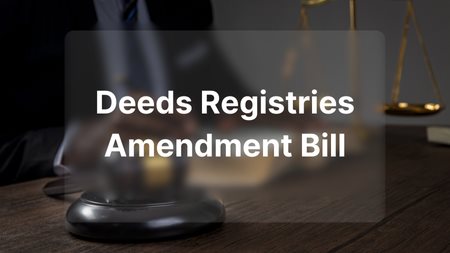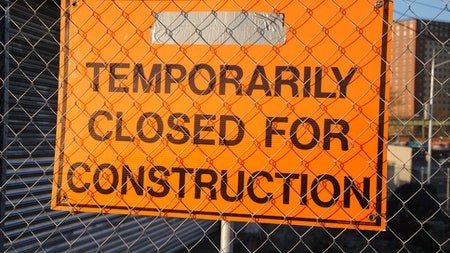Key changes: Deeds Registries Amendment Act, 2024
1. Digital property registration and electronic deeds system
The new law introduces an Electronic Deeds Registration System, allowing digital property transactions. This aims to reduce delays, enhance security, and prevent fraud by modernizing the way deeds are prepared, lodged, and stored.
2. Stronger security measures and penalties
The Act imposes strict penalties for unauthorized preparation, execution, or attestation of deeds and documents. Additionally, if a registrar or official acts in bad faith or with negligence, they can now be held personally liable for any resulting losses.
3. Simplified property transfers and land tenure updates
The law now allows for land tenure rights issued by the government to be formally recorded and converted into full ownership. It also streamlines joint property ownership transfers, reducing red tape for co-owners wanting to sell or mortgage their shares.
The Deeds Registries Amendment Bill, signed into law by President Ramaphosa in December 2024, introduces significant changes to the conveyancing process and modernizes the Deeds Office through digitalization. The Bill streamlines procedures that conveyancers must follow, enhances security measures, and aims to speed up property transfers while reducing fraud and errors in land records.
To ensure that the deeds process is improved, key personnel will be appointed. These positions include: a Registrar; a Deputy Registrar; and an Assistant Registrar of Deeds.
The Chief Registrar of Deeds will be mandated to develop, establish, and maintain the deeds registration and records systems, using information and communications technologies (ICTs). This will be applied to the preparation, lodgement, registration, records, execution ,and storing of deeds and aligned documents, as well as security and privacy safeguards.
Another notable change that the Amendment brings about is that penalties will be introduced in the case of unauthorised preparation, execution, and attestation of deeds and documents. These aspects will speed up the registration and transfer of deeds, as well as serving to control and combat fraud, errors, and duplication of land records.
Ultimately, says the government, these new measures will “enhance understanding of land and property ownership in the country.”
From the perspective of conveyancers and other property market stakeholders, the sentiment is that the property industry can only grow as a result of the Amendment, and with the expectation of further rate cuts, the Rand’s stronger performance, and an anticipated improved economy, the SA real estate market is set to be enhanced.
- Adrian Goslett, Regional Director and CEO of RE/MAX of Southern Africa, weighed in saying that “any improvement in the current Deeds Office registration process would be welcome. Leveraging technology to precisely capture transfer data is crucial for gaining deeper insights into the size and dynamics of the South African real estate market.”
- Yet another agency head, Richard Gray, CEO of Harcourt’s South Africa is also enthusiastic: “We welcome this step to digitise and modernise the conveyancing process and hope that it will lead to a quick implementation of the systems needed to support the Bill. Anything that speeds up the transfer process, cuts out fraud and potentially reduces costs to the home buyer should be encouraged.”
However, Illana Melzer, 71point4, a data analytics and research company, helping the Centre for Affordable Housing Finance in Africa to resolve title deed problems through the Tenure Support System has a few issues: “From our side, a couple of quick wins that could be implemented even without the changes to the Act might include a significant reduction in fees on low value property transfers. For instance, on a property valued at R220 000, buyers would have to pay the Deeds Office R682. Then there are a whole lot of other charges that might apply which could be waived (e.g. to get a VA copy of a title deed, or to correct errors on a title deed). This would really help poor households who might qualify for pro bono professional services but would still have to pay disbursements including deeds office fees.
“Another real challenge that is not addressed in the Bill is the fact that, according to the Act, the Deeds Office must charge for its data,” says Melzer. “So when another government department needs deeds data, they have to pay for it. This means is that various government departments including municipalities and human settlements departments (national and provincial) need to buy data from deeds data providers at significant cost. We have suggested that this be changed so that deeds data can be made available at no cost to other government entities but unfortunately this change was not included in this version.”
From a conveyancing perspective, Meyer de Waal, Director of MDW Inc legal firm, takes the view that this new Act is, overall, to be welcomed as the purpose is to speed up service delivery and turnaround times. However, he also mentions that while SARS is able to process transfer duty and VAT transfer receipts relatively fast and the deeds office being able to speed up registrations and become more efficient, there will be little impact if the local municipalities are not able to also improve their game. “It often takes a month or more to obtain a rates clearance certificate once the rates are paid up in advance, for simultaneous lodgement of all the supporting documents in the deeds office.”
Online and more efficient processes can assist to speed up the backlog of unregistered title deed owners, de Waal continues. “As per a recent presentation by the Tenure Support Centre, an NPO that supports formal tenure and property rights for low-income urban households in South Africa, there are +/- 1,6 million home owners who are already living in their own home, but still await transfer to their names.
“These home owners with no title deeds are sterilised to participate and use their properties as collateral to improve their lives, or may even find it difficult to insure their own homes and or bequeath such properties to their beneficiaries after their death through a will.”




